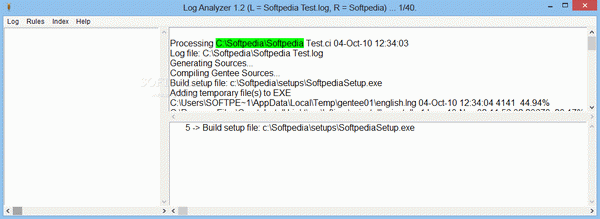Log Analyzer is an efficient and reliable piece of software aimed at helping programmers identify and repair application errors by analyzing log files and performing debugging operations.
This simple tool is made up of three main components: 'Log Viewer', 'Rule Set' and 'Index', each with their individual function, but working together to highlight essential details in log files.
The 'Log Viewer' is supposed to display a section of the original log file, allowing users to scroll down and look at up to 1000 lines from the contents of the document. The 'Rule Set' component is designed to manage the existing rules required to analyze the file. Last, but not least, the 'Index' offers users a list of rule matches discovered in the log.
The most important element of Log Analyzer are the rules. They contain several sections, specifically the 'Name', as a means of identification or the 'Example', which is a line corresponding to the set criteria; the 'Patterns' are list of strings that need to be in every log line in order for the rule to correspond; the 'Variables' consist of a list of strings that are 'trapped' between patterns on matching lines. Finally, the 'Format' defines how a match is supposed to be added to the 'Index'.
Log Analyzer is quite flexible, being usable with any software. In addition, it allows users to generate their own set of rules. It supports various programming languages, such as C, C++, Java, Python any many others. Moreover, the utility can analyze log data from any type of source.
With Log Analyzer, users can work with their own rules and scan entire log files, discovering and determining the cause of application failures. It is very useful in identifying errors, thus enabling developers for instance, to know where to start in order to repair them.

joao vitor
working serial. thanks
Reply
Enzo
how to use Log Analyzer patch?
Reply
alex
Thanks a lot for sharing Log Analyzer!
Reply
luan
Keep it up
Reply